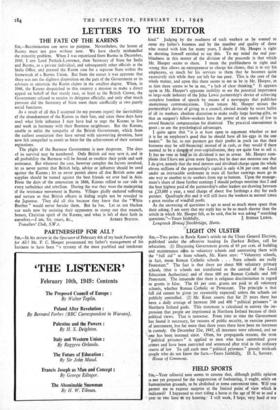LETTERS TO THE EDITOR
THE FATE OF THE KARENS
Sut,—Recrimination can serve no purpose. Nevertheless, the lesson of Burma must not pass without note. We have clearly mishandled the minority problem. When I was repatriated from Burma in December, 1945, I saw Lord Pethick-Lawrence, then Secretary of State for India and Burma, as a private individual, and subsequently other officials at the India Office, and pressed the Karen case for a separate State within the framework of a Burma Union. But from the outset it was apparent that there was not the slightest disposition on the part of the Government or its advisers to entertain the Karen claims in the smallest degree. When, in 1946, the Karens despatched to this country a mission to make a direct appeal on behalf of that sturdy race, so loyal to the British Crown, the Government refused to receive its delegates officially, and only after much pressure did the Secretary of State meet them unofficially at two purely social functions. As a result of all this I accepted (to my present regret) the inevitability of the abandonment of the Karens to their fate, and since those days have used what little influence I may have had to urge the Karens to live and work in harmony with their Burmese neighbours. But the Karens, unable to enlist the sympathy of the British Government, which from the earliest association they have served with unswerving devotion, have now felt compelled to resort toforce for the achievement of their national aspirations.
The plight of the Burmese Government is now desperate. The days of its survival may be numbered. Only British aid may save it, and in all probability the Burmese will be forced to swallow their pride and seek assistance. But whatever the case, however complex the factors involved, let us never permit that British help, advice or influence should be used against the Karens ; let us never permit above all that British arms and supplies should be turned against the best friends we ever had in Asia. From the days of the annexation in 1866, Karens rallied to our side in every turbulence and rebellion. During the war they were the mainspring of the resistance movement in Burma. Villages gladly endured suffering and torture so that British officers in hiding might not be revealed to the Japanese. They did all this because they knew that the "White Brother" would never forsake them. But he has. Let us not blacken our souls now by assisting their opponents to stamp out that staunch, honest, Christian spirit of the Karens, and what is left of their faith in






































 Previous page
Previous page